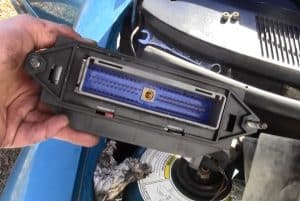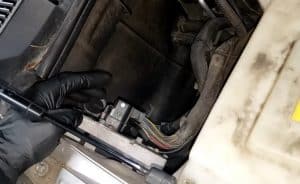The Powertrain Control Module (PCM) is a significant part of your car. It monitors and controls the transmission, engine, and other essential vehicle systems while you drive. You may have trouble if it stops working. So, how do I know the symptom of a lousy powertrain control module?
Well, there are a few situations with that, and you can understand the problem like sudden LOSS OF GAS MILEAGE, Increased Emissions, Misfires or Backfires, and more. Here I would like to discuss the symptom and how you can fix it. So keep continuing to know more!
What Is a Powertrain Control Module?

You can call the powertrain control module, also known as PCM, your vehicle’s brain. It controls all the engine, transmission, and other systems via sensor information. The PCM is one of many microprocessors in today’s automobiles that runs the air-con system to the windows.
To look normal on the outside, many PCMs contain an end MOA and ECM, each with its microprocessor and cookie ROM. This architecture enables the PCMs to live independently during the majority of the treatments that take place.
How Does the Powertrain Control Module Work?

Every second, the powertrain control module processes various information from sensors on various vehicle parts. The PCM looks for the following:
- Prevents your engine from revving past a predetermined RPM when servicing ancillary processes, such as air conditioning.
- Outfitted with sensors such as air quality, fluids, fuel and emission levels, camshaft angle, and throttle position.
- Diagnose to indicate engine failure. The check engine light will appear if the PCM cannot restore them.
- Adjusting the air-fuel ratio pumped into the car’s cylinders reduces fuel costs.
- Control Information such as transmission fluid temperature and state of charge SOC.
- Regulate spark discharge timing, helping the engine slip at a higher rpm level.
Symptoms Of A Bad Powertrain Control Module
The following symptoms would indicate that your car’s powertrain control module is not working correctly, making it necessary to fix the problem:
The ‘Check Engine Light Is On: If the check engine light appears, it is usually a sign that your car’s powertrain control module is malfunctioning. When it happens, the engine might fail to function correctly. A malfunctioning powertrain control module’s symptoms are the faulty operation of specific systems and ECU failure.
Losen Of Gas Mileage: If you notice a sudden decrease in gas mileage, the problem may be a failing powertrain control module. The sensors also detect any lagging or stalling occurring in the engine by automatically changing the engine load and speed.
Shifting Becomes Problematic: Another significant symptom of a faulty powertrain control module is transmission shifting problems. If the PCM fails, the car might be unable to shift out of a particular gear. It can result in any or all of the following:
Misfires or Backfires: Another common symptom of a faulty powertrain control module is that you hear the engine misfiring or backfiring. It sounds like a loud pop that comes from the engine area. A bad PCM can cause this to happen when the module fails to control the firing of individual cylinders.
Increased Emissions: If your car’s powertrain control module is not working, you might notice that your car’s fuel economy is lower than before. A failing powertrain control module can cause an increase in emissions by allowing the engine to run on a misfire cycle.
How To Fix Powertrain Control Module Troubleshooting?
Here are the ways how you can fix them. So let’s know about them.
Using An OBD Scanner: OBD II scan tools connect to a car’s computer system and check for error codes. The scan tool will let you know if there is a misfire from one of the cylinders. To do this, you will have to disconnect your battery. Then reconnect it to reset your computer system. Then, you can read any error codes stored in your PCM.
Checking for Misfires: You can use a multimeter to check for misfires. You can do it by unplugging the fuel injector and plugging it with your multimeter. Then, you will crack open the throttle to allow the engine to idle. Next, you will check each cylinder for misfires. If there are no signs of misfires, then the powertrain control module might be working fine. If there are signs of a misfire, you must repair or replace your powertrain control module.
Replacing the Powertrain Control Module: The powertrain control module can fail at any time. It is usually best to check for misfires before replacing the PCM. You will need to transfer all the parameters from your old PCM onto your new PCM. You can install this new part by sliding it underneath the steering column and then plugging it into its proper connector.
FAQs
What happens when the powertrain goes out?
When the powertrain control module fails, the PCM doesn’t send electrical signals to the ignition system. It fails proper fuel injection and can lead to engine damage. Run-on problems like low mpg, poor acceleration, and sudden stalling may also occur.
How do I reset my powertrain control module?
To reset the powertrain control module, you must disconnect it from the computer. Next, you will have to turn your ignition key until it is off and remove the battery for about 30 seconds. Then reconnect the battery and turn on your car to resynchronize with your PCM.
How much does it cost to fix the powertrain system?
The cost of replacing a powertrain control module depends on the size and make of your car and where you are having it repaired. The average cost to replace a PCM is around $60 and $2500. When you factor in labor, the cost can be much more expensive.
Final Word
If there is a problem with the powertrain control module, the car will not start. Use an OBD II scanner in your car to avoid facing bad PCM.
When you check the error code, it can let you know if there is a problem with your car. In case of a problem in your PCM, you should ensure that your engine can start on automatic mode.

As a mechanical engineer, it’s easy for David to explain the functionality of the tool. David test most of the tools before writing a review. its help him to learn something new and suggest the best product for you.





